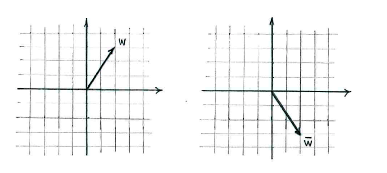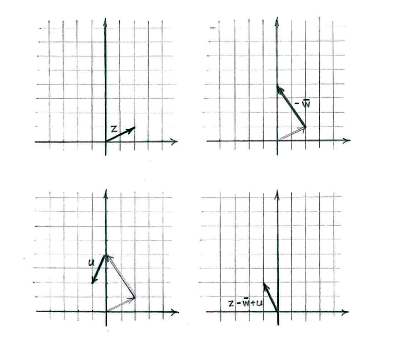Lösung 3.2:1d
Aus Online Mathematik Brückenkurs 2
(Unterschied zwischen Versionen)
K (Lösning 3.2:1d moved to Solution 3.2:1d: Robot: moved page) |
|||
| Zeile 1: | Zeile 1: | ||
{{NAVCONTENT_START}} | {{NAVCONTENT_START}} | ||
| - | + | If we calculate the expression, we get the answer at once: | |
| - | + | ||
| - | + | ||
| - | + | ||
| - | + | ||
| + | <math>\begin{align}z-\bar{w}+u &= (2+i)-(2-3i)+(-1-2i)\\ | ||
| + | &= 2-2-1+(1+3-2)i=-1+2i.\end{align}</math> | ||
| + | |||
| + | If, on the other hand, we interpret the expression in terms of vectors, we must first understand the vector <math>\bar{w}</math> geometrically. When we take the complex conjugate of <math>w</math>, we change the sign of the imaginary part, which is the same as reflecting <math>w</math> in the real axis. | ||
[[Image:3_2_1_d1.gif|center]] | [[Image:3_2_1_d1.gif|center]] | ||
| + | |||
| + | We can then construct the expression <math>z-\bar{w}+u</math> one term at a time. | ||
[[Image:3_2_1d-2(2).gif|center]] | [[Image:3_2_1d-2(2).gif|center]] | ||
| + | {{NAVCONTENT_STOP}} | ||
Version vom 10:38, 3. Okt. 2008
If we calculate the expression, we get the answer at once:
\displaystyle \begin{align}z-\bar{w}+u &= (2+i)-(2-3i)+(-1-2i)\\ &= 2-2-1+(1+3-2)i=-1+2i.\end{align}
If, on the other hand, we interpret the expression in terms of vectors, we must first understand the vector \displaystyle \bar{w} geometrically. When we take the complex conjugate of \displaystyle w, we change the sign of the imaginary part, which is the same as reflecting \displaystyle w in the real axis.
We can then construct the expression \displaystyle z-\bar{w}+u one term at a time.


